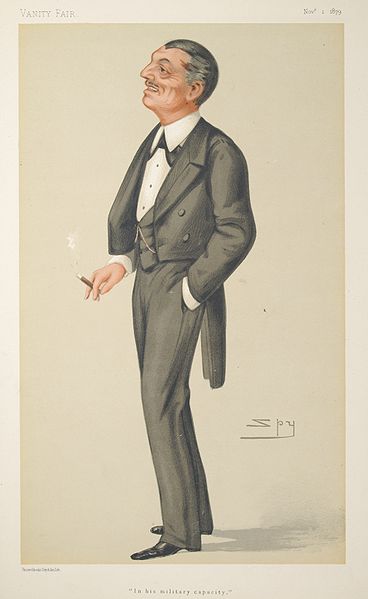The half-dozen of you who've read every entry in this blog may remember Montagu Williams as one of the prosecutors in the Sidney Clay case. Sidney, the bastard child of a tobacconist and a dressmaker, was either murdered or killed by neglect. This, on the other hand, was Montagu:
 | ||
I've just realised this sounds like I don't like him. That's not it. He must have been a lovely man to have an affair with.
Anyway, in 1891, the year before he died, Montagu claimed that he knew who the Ripper was but couldn't tell. Here's the story:
'I have something to say in reference to the Whitechapel murders that 1 think will be read with interest by many of my readers. Without entering into the details of those horrible tragedies, I may
mention that they all occurred within the Worship Street and Thames
districts, and that, as I foresaw the possibility of the assassin, if
arrested, being brought before me, I made it my business to personally
visit all the scenes of the crimes, and to make what medical and other
inquiries I thought desirable.
As my readers are aware, the murderer has not been arrested ; but a
curious set of circumstances which tend, perhaps, to throw light upon
the mystery came to my knowledge at the time.
For excellent reasons, I shall abstain, at any rate at present, from entering into the details of this matter.
It is not, however, that I lack the necessary permission of the person
principally interested. He has placed in my possession all the documents
relating to this matter, and has unreservedly given tile permission to
make whatever use of them I like. The reasons for my reticence are
concerned merely with the interests of justice.
I was sitting alone one afternoon, on a day on which I was off duty,
when a card was brought to me, and I was informed that the gentleman
whose name it bore desired that I would see him.
My visitor was at once shown in. He explained that he had called for the
purpose of having a conversation with me with regard to the
perpetrator, or perpetrators, of the East End murders. He had, he said,
taken a very great interest in the matter, and had set on foot a number
of inquiries that had yielded a result which, in his opinion, afforded
an undoubted clue to the mystery, and indicated beyond any doubt the
individual, or individuals, on whom this load of guilt rested.
My visitor handed me a written statement in which his conclusions were
clearly set forth, together with the facts and calculations on which
they were based ; and, I am bound to say, this theory-for theory it, of
necessity, is-struck me as being remarkably ingenious and worthy of the
closest attention.
Besides the written statement, this gentleman showed me copies of a
number of letters that he had received from various persons in response
to the representations he had made. It appeared that he had communicated
his ideas to the proper authorities, and that they had given them every
attention.
Of course, the theory set forth by my visitor may he a correct one or it
may not. Nothing, however, has occurred to prove it fallacious during
the many months that have elapsed since the last of this terrible series
of crimes.
As I have said, I cannot take the reader into my confidence over this
matter, as, possibly, in doing so I might be hampering the future course
of justice. One statement, however, I may make, and, inasmuch as it is
calculated to allay public fears, I do so with great pleasure. The
cessation of the East End murders dates from the time when certain
action was taken as a result of the promulgation of these ideas.'
My favorite Ripper theory still has Dr Watson at the culprit. Medical knowledge, criminal links, haring about rough parts of London. It's all very plausible.






